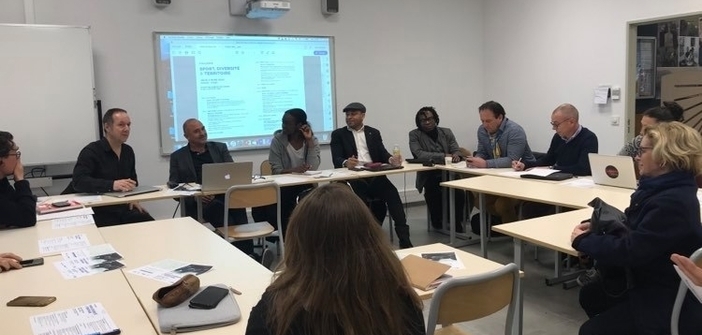The House of Human and Social Sciences hosted important debates this Thursday, with strong social resonance. The topics of discussion were sports, its relationship with diversity, and its connection to the territory. The agenda included three panel discussions, numerous questions, and many possible answers.
At 10 in the morning, it was time to attend a special class with distinguished professors of renown. Around the panel table, Yvan Gastaut, historian and lecturer at the University of Côte d’Azur, set the tone alongside Nicolas Bancel, historian and full professor at the University of Lausanne (ISSUL), co-director of the Achac Research Group, and Pascal Blanchard, historian, member of the CNRS Communication and Politics Laboratory, and co-director of the Achac Research Group.
The issue of diversity is crucial to discuss in the sports field. It is broad and multifaceted. In diversity, we address men and women, skin colors, ethnic origins, disabilities, etc. It intersects with the notion of parity, an issue that arises very early in sports, even before engaging in citizenship participation. “Even before the question could allow women to vote, the issue of women’s participation in the Olympic movement was raised,” explains Pascal Blanchard, who introduced the subject. “The same applies in colonial empires for the sports participation of indigenous populations.”
Sport is the first space (along with the military) that features diversity
“Sport reflects a fundamental notion of people who are excluded from the concept of common citizenship and suddenly come to symbolize a nation.” The debate revolves around a delicate yet necessary topic touching on notions of identity, discrimination, racism, and equality. Everyone at the table lends their legitimate voice to shed light on the topic. Aya Cissoko, world boxing champion, author, and actress, not only provides her internal perspective but also defends the genuine struggle for women’s place, particularly for “racialized women.” Pierre Tartakowsky, honorary president of the League of Human Rights, does not mince his words either. For Yvan Gastaut, the takeaways are that “the world of sports is fragile and fickle. In this field, racism and anti-racism coexist with great complexity, and the current sports authorities are incapable, for now, of receiving the voice of the athlete.”
The first debate focused on four major points:
– The question of values and the narrative surrounding sports, inherently good, serving as a vector of integration, sharing, diversity, and tolerance, contrasted with the use of sports by totalitarian political regimes.
– The question of the competitive spirit at the onset of sports invented by the British in the 19th century to modernize capitalism.
– The question of mediocre institutions in France in terms of diversity and parity.
– The issue of racism, a crucial topic.


